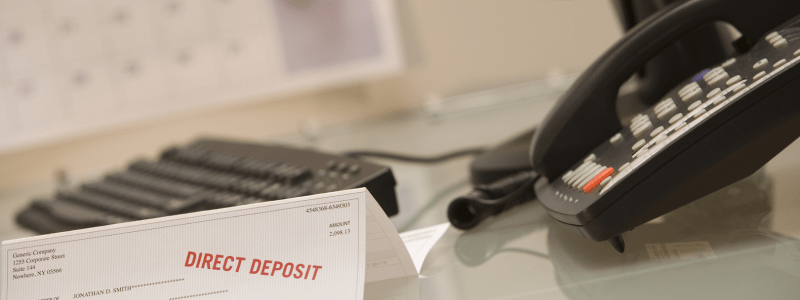
Direct deposit has revolutionized how we receive payments, offering a seamless and secure way to handle finances. As we approach 2024, understanding Direct Deposit Payment Eligibility 2024 and maximizing the benefits of direct deposit is crucial. Let’s dive into the essentials you need to know to make the most of this convenient payment method.
What is Direct Deposit?
Direct deposit is a payment method where funds are electronically transferred directly into your bank account. It’s commonly used for salaries, government benefits, tax refunds, and other recurring payments. This system eliminates the need for physical checks and the trip to the bank, making financial transactions much more efficient.
Benefits of Direct Deposit
- Convenience: With direct deposit, your funds are automatically transferred to your account, saving you time and effort. No more standing in long lines at the bank or worrying about losing a check.
- Security: Direct deposits reduce the risk of stolen or lost checks. The electronic transfer is encrypted and follows strict banking protocols, ensuring your money reaches your account safely.
- Speed: Direct deposits are usually processed faster than physical checks. In many cases, you can access your funds on the same day the payment is issued, which is particularly beneficial for urgent financial needs.
Eligibility Criteria for Direct Deposit in 2024
- Basic Requirements: Most individuals with a valid bank account and a stable source of income are eligible for direct deposit. Ensure your account is capable of receiving electronic transfers.
- Employer Policies: Employers often have specific requirements for setting up direct deposits. Check with your HR department or employer for any forms or procedures you need to follow.
- Bank Requirements: Some banks might have their criteria for receiving direct deposits. Confirm with your bank that your account is set up correctly to receive electronic payments.
Setting Up Direct Deposit
- Necessary Information: To set up direct deposit, you’ll need your bank account number, routing number, and sometimes a voided check for verification.
- Steps to Enroll: Contact your employer or the organization issuing payments. Fill out any necessary forms and provide the required banking information.
- Verifying Your Setup: Once enrolled, monitor your account to ensure that payments are being deposited correctly. It might take one or two payment cycles to verify the setup.
Maximizing the Benefits of Direct Deposit
- Automating Savings: Direct deposit allows you to split your paycheck between multiple accounts. Consider setting a portion to go directly into a savings or retirement account, automating your savings plan.
- Budgeting Tips: With funds consistently deposited, it’s easier to budget your monthly expenses. Use budgeting apps or tools to track your spending and manage your finances effectively.
- Financial Planning: Regular direct deposits help in creating a reliable cash flow. This consistency is crucial for effective financial planning, allowing you to manage investments, pay bills on time, and save for future goals.
Common Issues with Direct Deposit
- Delays in Processing: Sometimes, direct deposits may be delayed due to bank holidays or processing errors. Always have a small financial buffer to cover any unexpected delays.
- Incorrect Information: Ensure that the information provided for direct deposit setup is accurate. Incorrect account numbers or routing information can lead to failed transfers.
- Troubleshooting Solutions: If you encounter issues, contact your employer or bank immediately. They can provide insights and solutions to resolve the problem promptly.
Security Measures for Direct Deposit
- Protecting Your Information: Always keep your banking information private. Avoid sharing your account details over unsecured networks or with unverified entities.
- Avoiding Scams: Be wary of phishing emails or fraudulent calls asking for your banking details. Always verify the source before sharing any information.
- What to Do in Case of Fraud: If you suspect fraudulent activity, contact your bank immediately to freeze your account and investigate the issue. Report the fraud to the appropriate authorities.
Comparing Direct Deposit with Other Payment Methods
- Paper Checks: While traditional, paper checks are less secure and slower compared to direct deposits. They require manual processing and are prone to being lost or stolen.
- Prepaid Cards: These can be convenient for those without bank accounts, but they often come with fees and lack the security and speed of direct deposits.
- Mobile Payment Apps: Apps like Venmo or PayPal are great for peer-to-peer transfers but may not be suitable for regular income payments due to limits and fees.
Impact of Direct Deposit on Credit Scores
- Positive Effects: Regular direct deposits can help maintain a stable cash flow, aiding in timely bill payments and reducing the likelihood of missed payments, which positively affects your credit score.
- Potential Risks: Incorrect account setups or delays can lead to missed payments, negatively impacting your credit score. Ensure all details are correct to avoid such issues.
Direct Deposit for Different Types of Incomes
- Salaries and Wages: Most employers offer direct deposit for regular paychecks, providing a steady and predictable income stream.
- Social Security and Government Benefits: Government agencies prefer direct deposit for distributing benefits, ensuring recipients receive their funds promptly and securely.
- Freelance and Gig Economy Earnings: Freelancers can set up direct deposit with clients or use third-party platforms that offer direct deposit options, ensuring faster payments for their services.
Future Trends in Direct Deposit

- Technological Advancements: As technology evolves, direct deposit systems will become even more efficient and secure. Expect innovations like real-time payments and enhanced security features.
- Policy Changes: Governments and financial institutions may introduce new regulations to further streamline direct deposits, making them more accessible to a broader population.
Direct Deposit for Small Businesses
- Benefits for Employers: Direct deposit reduces the administrative burden of processing payroll, improves cash flow management, and enhances employee satisfaction.
- Setting Up for Employees: Small business owners should work with their bank or payroll service to offer direct deposit options for their employees, ensuring a smooth setup process.
International Direct Deposits
- Cross-Border Payments: Direct deposits can be used for international payments, but it’s essential to understand the currency exchange rates and fees involved.
- Currency Considerations: Be aware of potential fluctuations in exchange rates that can affect the amount received. Using banks that specialize in international transfers can mitigate these risks.
Conclusion
Direct deposit is a powerful tool for managing your finances efficiently. By understanding the eligibility criteria and maximizing its benefits, you can enjoy a seamless, secure, and speedy payment experience. Embrace direct deposit in 2024 to simplify your financial life and ensure your payments are always on time.
FAQs
1. What is the primary benefit of direct deposit?
The primary benefit of direct deposit is its convenience, allowing funds to be electronically transferred directly into your bank account, saving time and ensuring quick access to your money.
2. How can I ensure my direct deposit information is secure?
To ensure your direct deposit information is secure, keep your banking details private, use secure networks when sharing information, and be cautious of phishing scams.
3. What should I do if my direct deposit is delayed?
If your direct deposit is delayed, contact your employer or bank to investigate the issue. Having a financial buffer can help manage unexpected delays.
4. Can freelancers use direct deposit?
Yes, freelancers can use direct deposit by setting it up with clients or through third-party platforms that offer direct deposit options, ensuring faster and more secure payments.
5. How does direct deposit affect my credit score?
Regular direct deposits can positively affect your credit score by helping maintain a stable cash flow, enabling timely bill payments. However, incorrect setups or delays can negatively impact your score.
For more insights into effective budgeting and financial management strategies, explore our detailed guide on WHAT IS BUDGETING AND WHY IS IT IMPORTANT?
